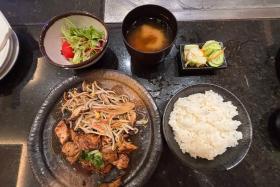Slow down when breaking fast
Prone to diabetes, Health Promotion Board urges Malay community to eat healthy during Ramadan and Hari Raya
When Madam Khiriah Yasir found out that she had prediabetes in 2015, she immediately did something about it.
The part-time cashier, 57, told The New Paper: "Although prediabetes does not require any medical treatment, failing to adjust my lifestyle habits could lead to diabetes."
Her diagnosis led her to change her eating habits and traditional Malay recipes, especially for Ramadan.
She said: "I reduced the amount of coconut milk used in lontong, rendang and chicken curry. I also stopped adding sugar to sambal . I try to cook healthier dishes such as wholegrain spaghetti with minced chicken in mushroom sauce.
"When going out with friends to break fast, most of the food we ate were often oily and sweet. I opted to go for fewer meals outside and eat healthier at home instead."
Madam Khiriah has reduced the amount of sugar, oil and salt consumed in her diet, and she has started eating more vegetables.
She said: "I feel healthier and my weight dropped from 70kg to 63kg. Such changes have also been helpful in managing my high blood pressure and high cholesterol levels."
After a long day of fasting during Ramadan, some may have the tendency to eat too quickly and hence overeat.Health Promotion Board nurse educator Badriyah Jamaludin
During Ramadan, she prepares oats and wholegrain bread for Sahur (pre-dawn meal) as they help stabilise blood sugar and help her stay full when fasting.
She has also stopped eating fried rice or roti prata for breakfasts.
Madam Khiriah said: "When it comes to breaking fast during Ramadan and feasting during Hari Raya, it is important to eat in moderation.
"When preparing meals for the family, I use only wholegrain ingredients and lean meats such as fish and chicken. I always keep a lookout for products with the Healthier Choice Symbol."
DIABETIC
Over 400,000 Singaporeans are living with diabetes, and one in three runs the risk of developing diabetes, according to statistics from the Health Promotion Board (HPB).
The Malay community is especially prone to contracting the disease - almost one in two Malays over the age of 60 has diabetes.
For the festive season, HPB has launched a campaign to encourage the community to adopt healthy eating habits during Ramadan and Hari Raya with the tagline, "Korang ok? Kurangkan ok?" (or "Are you ok? Reduce it ok?" in Malay).
This year, the message to the Malay community is "Kita dah cukup manis" ("We are sweet enough"), emphasising the importance of consuming less sugar in food and drinks.
Ms Badriyah Jamaludin, a nurse educator at HPB, told TNP: "During Ramadan, a wide variety of sweetened beverages, such as air katira and bandung, as well as popular Malay food such as tahu goreng and mee siam, which contain a high amount of sugar, are often served during iftar (breaking of the evening fast).
"After a long day of fasting during Ramadan, some may have the tendency to eat too quickly and hence overeat."
Breaking fast with friends and family can also contribute to overeating.
She said: "This can lead to expectations that one should consume and enjoy all the food available, as a sign of gratitude while immersing oneself in the spirit of sharing."
Ms Badriyah also highlighted the need to eat nutritious food to make up for the effect of fasting.
She said: "At Sahur, it is important to consume food that falls into the three major categories - wholegrains, fruits and vegetables, as well as meat."
She added: "Hari Raya is a time of celebration with food and drinks, but it is important to continue practising the healthy eating habits cultivated during Ramadan, which includes eating in moderation."
Healthy tips for Ramadan
The Health Promotion Board has some tips for the Malay community who are fasting during Ramadan:
- Ask for less sugar in drinks or pick packaged drinks with the Healthier Choice Symbol. Opt for plain or fruit-infused water instead of sweetened drinks .
- Be mindful of portion size during iftar to avoid overeating. One good way to do so is to eat dates to start iftar as they are easy to digest and help to decrease the feeling of hunger, thereby preventing overeating.
- Eat slowly to avoid excessive eating as the brain takes about 20 minutes to register fullness.
- When dining out, choose healthier options like dishes labelled with the Healthier Choice Symbol.
- Swop high-calorie food such as deep-fried dishes and items containing curry and gravy with lean meat, fruits, vegetables, broth-based soups and wholegrains. These foods, which are high in fibre and water content, will keep you feeling full for longer and have been shown to lower the risk of developing diabetes.
- When indulging in high-calorie food, practise portion control.
- White rice can be replaced by brown rice in dishes such as lontong.
- Fill half your plate with fruits and vegetables, a quarter with brown rice or wholemeal bread and the other quarter with protein such as meat, fish or tofu.
- Choose healthier cooking methods such as baking, grilling, air-frying or steaming, instead of deep-frying.
- HUANG RUNCHEN
Get The New Paper on your phone with the free TNP app. Download from the Apple App Store or Google Play Store now





